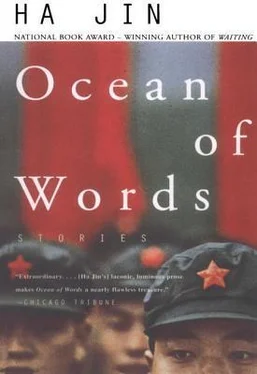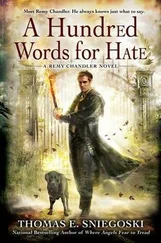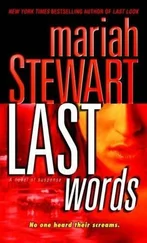None of us had expected this slender lad to speak so well. His thin lips quivered after he stopped, and his long eyes gleamed.
Impressed, some of us struck up a conversation with him after the meeting. I thought Jee must have been a high school graduate, unlike me, who had gone through elementary school only. I wanted to get close to him but didn’t know how.
In the evening we studied newspapers together, Guan Chi and Jee Jun by turns reading out a long editorial, “Resolutely Punish the Russian Chauvinists.” After the study, we were preparing for bed. Wu Desheng smiled to himself, still sitting on the timber. “Jee Jun, you sounded funny when you read aloud, you know.”
“How?” Jee asked, unlacing his boots.
“You sounded like a girl.”
“Damn your mother!”
We all laughed. Wu’s eyelids were flapping. “It has nothing to do with my mother. You really sound like a girl. Don’t you think so, Fan Hsiong?”
He asked me, but before I could answer, Wang Fukai cut in, “Look, he looks like a girl too.”
“I look like your grandpa!”
We laughed again. Jee indeed resembled a girl, with a pale face, curved eyebrows, pink cheeks, slim hands and feet. “What a discovery,” Song Ang said. “We have a young lady among us.”
“Miss Jee, nice to meet you.” Guan Chi stretched out his hand.
“Miss Jee, how do you do?”
“Welcome to our squad, Miss Jee.”
“Can I help you, miss?”
“I screw all your mothers!”
Squad Leader Lu intervened. “Enough, men.” He turned to Jee. “Don’t take it to heart, Jee Jun. They were just joking, no hard feelings.”
We didn’t sleep well the first night. At eleven sharp, a horn burst out honking in the corridor like a crazy goose, and we all jumped up groping for our clothes in the dark. The electricity was out. Squad Leader Lu said in a subdued voice, “Emergency muster! Pack up your stuff, take your weapons, and follow me out.”
We were fumbling in the large straw bed. Zhang Min cursed and couldn’t find his socks; his large body knocked me about. Jee moaned weirdly while struggling to put on his clothes. A mug dropped on the floor. “You took my hat, Song Ang.” That was Wu Desheng’s thick voice.
“Quiet!” the squad leader said.
I forgot how to tie up a field pack. Trying twice without success, I gave up, simply binding my quilt and pillow into a roll. Thank Heaven, I found my mittens in the straw. With the baggage on my back, I rushed to the rack for my rifle.
Following Squad Leader Lu, we ran into the starry night. The ground was slippery and the air piercingly cold. “Put on your nose cover,” he ordered. That was a narrow piece of fur buttoned to the earflaps of a hat to prevent the nose from freezing. We executed the orders while running. Many squads were already gathered on the playground. The second we reached there, Squad Leader Lu ran to Company Commander Su to report our arrival. Meanwhile, two more squads were coming, their boots drumming the icy ground.
“Comrades,” Commander Su called out, “we just received orders. A fight has broken out at the border. The Regimental Headquarters ordered us to reach the front within an hour.” He paused, then shouted, “Right face!”
We turned. He ran to the head of our lines. “Squad One, follow me!”
A moment later we were running in a single line along a path toward Hutou Town, which was five li away from the middle school where we were quartered. The night was glimmering slightly, and a few waves of snow dust were shoving one another in the lazy wind. In the northern sky the Big Dipper, silvery and blinking, stretched to the distant hills. It was quiet everywhere except for our boots treading the snow and the words passed in muffled voices, “Close up!” or “Watchword: Victory.”
To our surprise, we did not continue to run north toward the border after we entered Hutou Town. Instead we circled around a few blocks, then dashed back to the school. My eyes were fixed on Jee Jun’s field pack in front of me, as though his baggage were able to pull me forward, while my legs went weak and no longer felt like my own.
When we returned, all the lights were on in the schoolhouse. Our room was a mess. On the floor were scattered mugs, canteens, pillows, toothbrushes, socks, photographs, ammunition belts, notebooks, mittens, shirts.
“What’s this, Fan Hsiong?” Zheng Yuan asked me and slapped my back. “Is this a field pack or a hay bundle?”
Seeing my baggage roll, some of my comrades whooped and a few applauded. I was annoyed but said nothing.
“Look!” Song Ang cried, “look at Jee’s butt.”
We all turned and found the fly of Jee’s trousers gaping on his behind. The entire squad broke out laughing. Jee swung around and dropped his hips on the radiator beneath the window. “I, I had no time to, to put it right.” He flushed.
“You don’t need the fly anyway,” Song Ang said, blowing his broad nose with a handkerchief. We laughed some more.
Soon afterwards, a couplet began circulating in the Recruit Company. It went:
Miss Jee toured the borderline
With the fly open on her behind.
The doggerel at once established Jee’s nickname among the soldiers. He had no choice but to accept it. Calling him Miss Jee, we bore no malice against him; the recruits’ life was hard, and we needed some fun.
In the beginning, whenever we talked about weapons and wars, Jee would join us, but he was ignorant of military science. Though he said he wanted to fight the Russians, he was not cut out to be a soldier at all; he couldn’t even tell a tactic from a strategy — he used the two words as if they were identical in meaning. Unable to contribute anything to our discussion of battles and weaponry, he soon withdrew to a corner to read alone or write in his green notebook. He kept a diary.
Despite his fondness for books, Jee was not learned. In fact, he had gone to middle school for only one year. Quite a few of us were better scholars than he was. For example, Song Ang, a sprinter who could do the hundred-meter dash in 11.9 seconds, was the most knowledgeable about weaponry and wars. Because his father was a commander on a missile destroyer at Port Arthur, Ang had read a lot of the navy’s classified books and documents. He provided us with information on different types of artillery and warships, especially the Russians’ nuclear submarines carrying intercontinental missiles. Guan Chi also knew a lot. He looked scholarly and would put on steel-rimmed glasses when reading. In addition, he was an experienced fighter. He told us that at home he and his pals had once driven a T-34 tank on the streets and fired its two machine guns at the buildings occupied by those revolutionary rebels who held a different theory of revolution from theirs. They had also raided restaurants at midnight and carried back fried dough sticks and roasted chickens on their bayonets.
I slept between Jee Jun and Zhang Min, who had been my classmate back home. Zhang snored a lot at night. It didn’t bother me, since I was told that I also made noises. Jee didn’t snore, but he was often restless in his sleep. He’d hit my chest with his elbow, or kick my thigh, or give me a jab in the back. When I complained about this “night fight,” my comrades would say I was lucky to sleep and frolic with a young lady every night. Then they’d ask Jee, “Would you like to go with me, Miss Jee?” “Can I share the bed with you tonight, Miss Jee?” “Miss, how do you like me as a young man?” “How much do you charge per night, miss?” Jee never answered and merely glared at the questioners.
One night, he roused me. He pulled my arm and whispered, “Look, look at that girl over there. Isn’t she beautiful? Like a little willow.” He smiled, then murmured something inaudible.
Читать дальше











